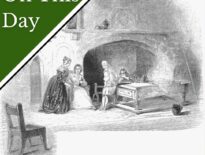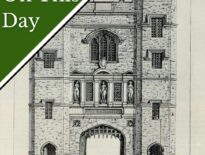This week's Monday Martyrs are Protestants William Allen, Roger Coe and Thomas Cob, who were burnt at the stake at the beginning of September 1555, in the reign of Queen Mary I after being condemned together by John Hopton, Bishop of Norwich, for heresy on 12th August.
William Allen was burnt at Walsingham in Norfolk, Roger Coe was burnt at Yoxford in Suffolk, and butcher Thomas Cob was burnt at Thetford in Norfolk.
William Allen was a labourer and a servant of John Houghton of Somerton. When he was called before the Bishop of Norwich, Allen was asked why he'd been imprisoned. According to martyrologist John Foxe, Allen explained that he'd been imprisoned for refusing to follow the cross in processions. Hopton urged Allen to return to the Catholic fold, and Allen replied that "he would turn to the catholic church, but not to the Romish church" and that he would never follow or kneel down to the cross. He was condemned to death and, some time at the beginning of September 1555, taken to Walshingham to be executed. Foxe notes that Allen "had such credit with the justices, by reason of his upright and well-tried conversation among them, that he was suffered to go untied to the suffering, and there, being fastened with a chain, stood quietly without shrinking until he died."
Roger Coe (Coo, Cooe) was a shearman from Melford in Suffolk. When Bishop Hopton asked him why he'd been imprisoned, Coe told the bishop to ask his accuser, who then explained that Coe had refused to take the sacrament. When asked why he would not receive the sacrament, Coe said that "the bishop of Rome had changed God's ordinances, and given the people bread and wine, instead of the gospel and the belief of the same", explaining "Our Saviour said, My flesh is meat indeed, and my blood is drink indeed. He that eateth my flesh, and drinketh my blood, abideth in me, and I in him; and the bread and wine doth not so." The bishop then accused him to slandering the holy fathers. The bishop went on to ask Coe if he's obey the monarch's laws, to which Coe replied "As far as they agree with the word of God, I will obey them". The bishop disagree with Coe, commenting "Whether they agree with the word of God or not, we be bound to obey them, if the king were an infidel."
After a spirited exchange with the bishop, which you can read here, Coe was condemned to death. Foxe writes:
"This Roger Coo, an aged father, after his sundry troubles and conflicts with his adversaries, at length was committed to the fire at Yoxford, in the county of Suffolk, where he most blessedly ended his aged years, A. D. 1555, in the month of September."
Thomas Cob was a butcher from Haverhill in Suffolk. Foxe explains that Cob was taken before Michael Dunnings, Chancellor of Norwich, and examined regarding his beliefs on the sacrament, i.e. whether he believed that Christ was "really and substantially in the sacrament of the altar". Cob replied that Christ's body was in heaven and that according to scripture, after Christ had ascended to heaven he had not descended again. He, therefore, could not be in the sacrament. When the chancellor asked Cob if he would obey the laws of the land "made for the unity of faith", Cob replied that "his body should be at the king and queen's commandment, so far as the law of God would suffer, &c." He was then condemned to death and burnt at Thetford.
Notes and Sources
- 310 WILLIAM ALLEN, ROGER COO, AND THOMAS COBB, John Foxe's Book of Martyrs online at https://www.exclassics.com/foxe/foxe312.htm



Thanks for the article,Claire. I live in Yoxford, and have done so in excess of thirty years but did not know of the burning of Roger Coe.
Therefore, I found the article exceedingly interesting. Once again my thanks to you.